- Genre: Action RPG
- Platform: PS4
I think it’s a disservice to this game that they called it Final Fantasy VII Remake. Sure it’s taking the core of the original game and literally remaking it. However, it’s only Midgar, but it’s so much more than that (and I’ll get back to that). It’s taken what was a relatively inconsequential setting and made it into a full-length experience that doesn’t feel stretched. It’s completely turned the gameplay on its head and made it a completely different gameplay experience. I went in with somewhat high hopes that the gameplay itself would feel good in a more modern style, but I wasn’t expecting the rest, and I come out having finished it completely floored at how great the game was.
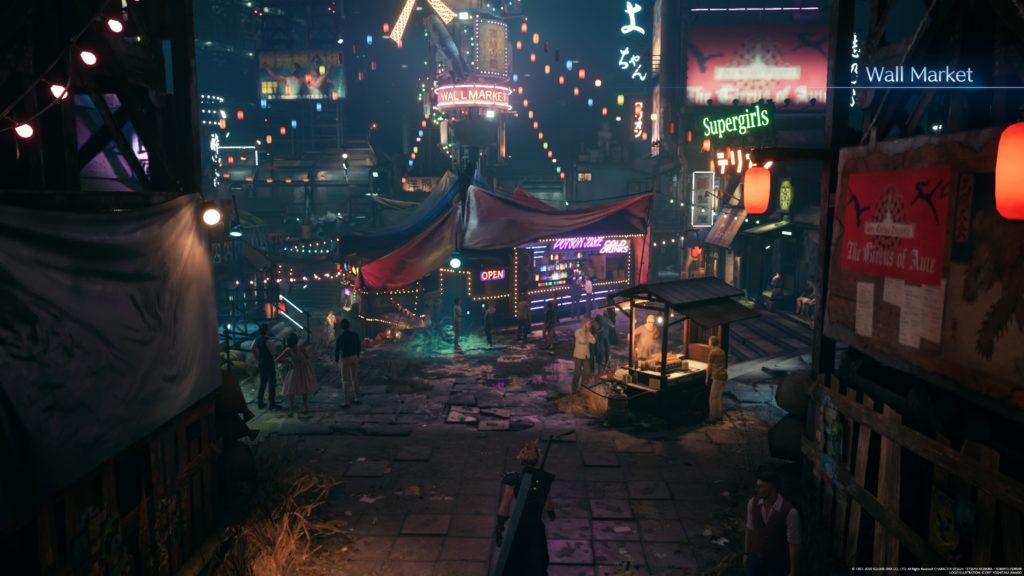
In a lot of ways, this feels like a lot of lessons learned from the past couple mainline FF titles.
13 took a lot of flack, and rightfully so, for having a very linear start, but moreso that it just didn’t feel alive. 7R is just as linear, but the pieces are so full of life. The 7 slums? It’s more than just a bar now. There’s apartments and shops and people going about their daily life. Wall Market? Now it feels like a grungy Vegas instead of just a collection of buildings with neon on them. While things are generally go point A to B, there’s so much more there than in 13 that it works so much better.
Some little things add a lot of depth to this. Ya there’s side quests, but they’re all voice acted. The characters you meet and help feel like living people, instead of just an exclamation point to start at. Seventh Heaven wasn’t just the bar for story reasons, it felt like a community center for the sector 7 slums. The upper plate wasn’t just a vague section for rich folks that was mostly unseen, but in your interactions with its people on a few occasions it was clearly a place that mostly existed for your average Shinra worker. All of this helped pad out the world, so instead of being linear and dead, it felt like a full world, even without open exploration.
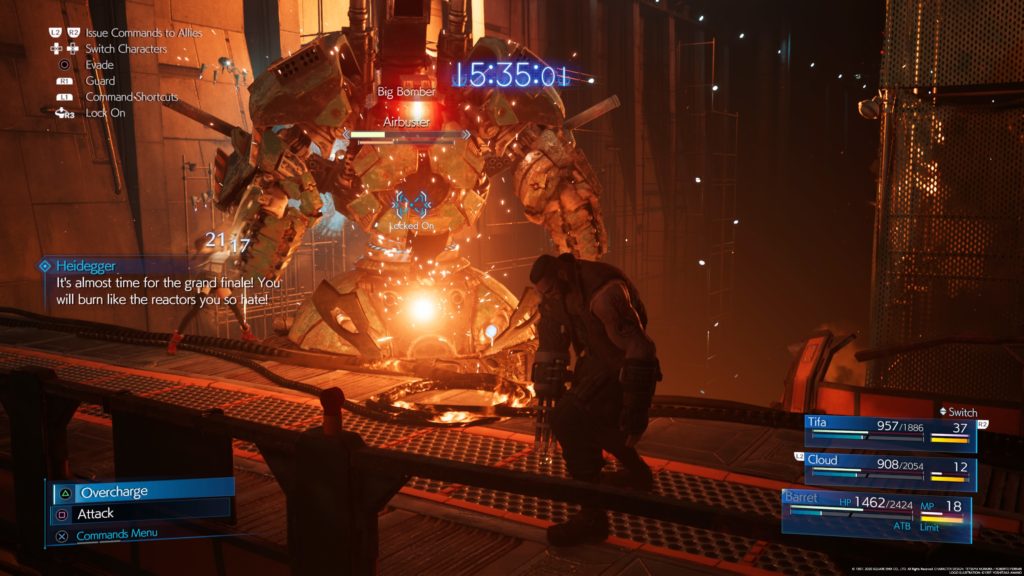
15 had a combat system that went way off the beaten path for this series. It was sort of action-based, and sort of turn based. However, the action being centered around holding a button to do automatic chains worked well, but was kind of strange. The action system in 7R feels a lot more direct, and importantly a lot more defense-oriented. Basic attacks are direct inputs, but in a way that makes sense for the character. Cloud and Tifa are a button press to attack, but that makes no sense for a machine gun or magic streams for Barrett and Aerith. So…..they don’t. They hold to attack, and it just makes sense. All of that charges up the ATB meters, which is where the rhythm of a turn-based system comes into play.
I don’t know that I’ve played an action RPG that’s so seamlessly integrated a sort of turn-based rhythm, but it works really well here. I tended to jump around to the person that felt most natural to my current needs in the fight to really aggressively charge an ATB meter, but I was always using the other party members abilities at the same time. Hitting the skills button, watching the game slow down to super slo-mo, and planning out which ability or magic power to use felt really good. It gave important points where I could slow down and breathe, plan out my moves a bit, then get right back into the action.
The defensive aspects are also way out in the forefront here. Dodging large attacks is super important to avoid wasting healing. Blocking smaller damage becomes a really important source of ATB charging. Parrying attacks with Cloud becomes an important way to cause enemies to stagger. Using your magic dealers to cast slows or poisons or sleeps or stuns becomes an important way to mitigate group fights to allow you to focus on important targets. As a whole, it lets you treat the defensive side of things as a tool in combat, rather than a necessity to simply reduce damage.
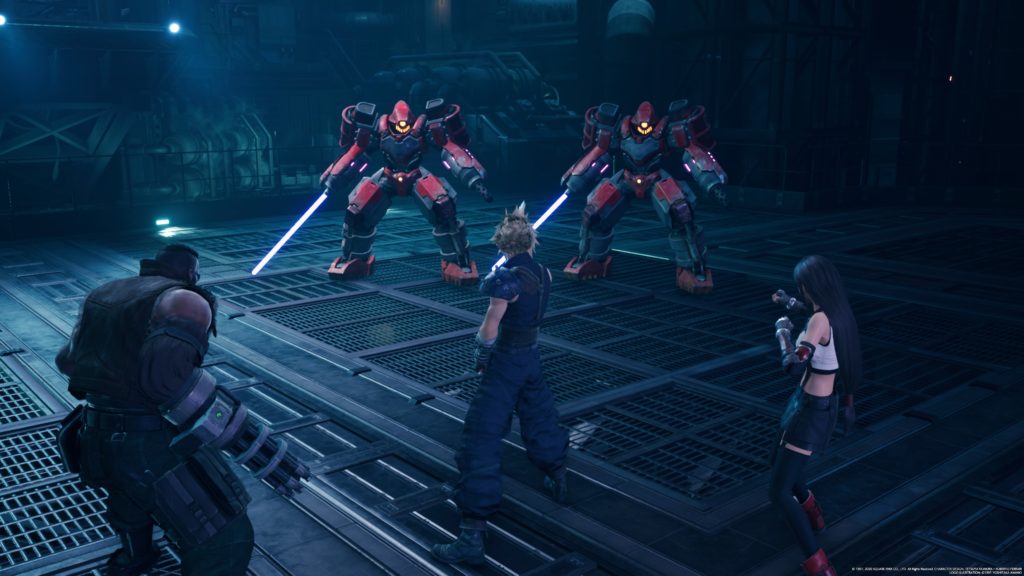
The game also definitely borrows from 13 in its use of a stagger mechanic that comes into play primarily on bosses. Hitting the enemies will increase a stagger meter, which on completion allows for serious damage output. General attacking will eventually fill it, but you’re encouraged to really lay into weaknesses to fill it faster. Some of these are tactical (swap between magic and physical attacks when an enemy has barrier or shield up), some of these are practical (use lightning on enemy robots), some of these are defensive (blocking a melee attack boosts stagger). However, it all feels straight out of 13 where smart use of staggering is often the end goal to do large damage, rather than simply focusing on spam attacks.
This all comes together into some of the most consistently great boss fights I’ve ever seen in an RPG. Every boss had its own little mechanics to deal with, weaknesses to find, opportunities to attack. The thing that really impressed me though is that the fights found the magical place where they were long fights – generally 5+ minute affairs – with multiple phases, but they never felt like a grind. They weren’t necessarily easy and you’d die if you weren’t paying attention, but they felt fair. Blindly using your resources wasn’t a good plan of attack, but resources aren’t so rare that you simply hold onto them forever out of fear. This is all helped by the fact that the stress of dying wasn’t there. They’ve embraced the modern touch from 15 of having checkpoints immediately before any fight sequence, so a death means you don’t lose progress – you simply try again. It leaves fights in a place where they can be challenging and fun and capable of making you think on your feet and being mechanically heavy and you just go along and enjoy the ride.
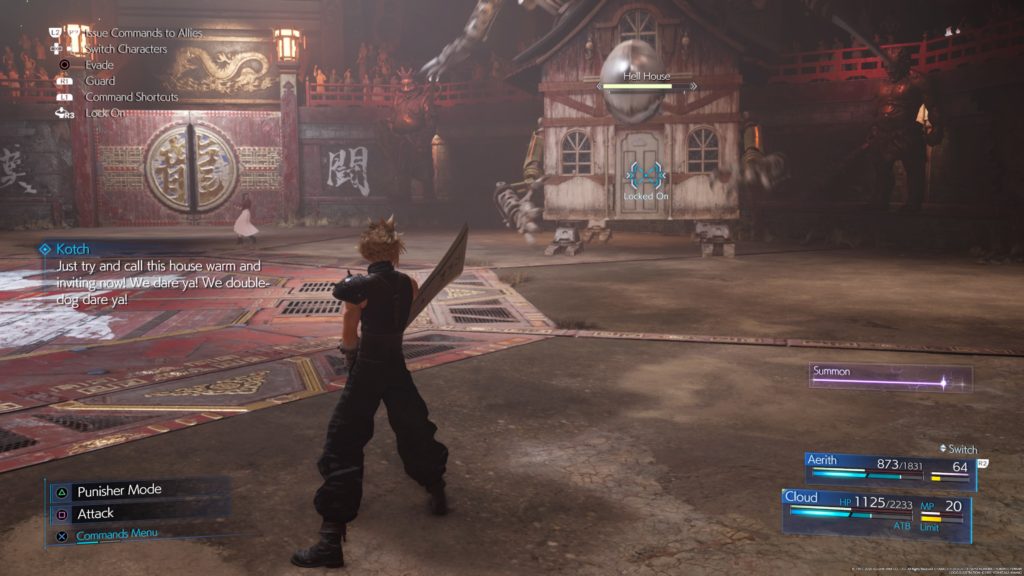
However, the biggest surprise is how they steered the story, as it presents a lot of potential changes to the original, and this is where I get into spoiler territory:
There’s some obvious addition to the character depth here, whether it’s the Avalanche side members or the general relationship between the core party. That was always going to happen. This remake was taking a 5 hour introductory section of the original and making it into its own standalone 30 hour game. However, there’s a few specific things that lead me to believe remake part 2 is going to be a much larger change than this one.
The first big change is that Zack Fair appears to be alive in some form. They show him in his last stand from Crisis Core, but by the end he’s shown alive and carrying Cloud back to Midgar. There’s some amount of implication that this exists in a sort of parallel timeline, which opens up the interesting possibilities of either jumping between timelines or straight out changing the past.
The second big change is a question over whether or not the party is even on the original timeline by the end of the game. Throughout the game, the party now goes up against creatures called Whispers that attempt to keep people on their destined path. During the last stretch, the party is fighting against the leader of this group, and ultimately trying to forge their own path. Part of the fight is the player seeing flashes of events that are fated to occur, including the death of Aerith. However, it’s implied that these visions are the events that will occur, if the party does not defeat the creatures that control fate. In defeating fate, it seems like the party should now have control over their path.
I’ve also had friends speculating that what we aren’t seeing isn’t actually a retelling of the original story, but a potential alternate timeline in itself. A few times throughout the game, it’s hinted at that this Aerith has some ability to see what’s going on in the future, or at least knows more than she’s letting on. If she’s able to see across timelines, it could easily explain this game being a different timeline entirely where the Whispers are trying to keep it in alignment with the original game’s timeline.
Those things are huge potential changes to the original story. Is the party going to be able to meet with the living Zack? Is Aerith going to live because the timeline has now been changed, or is that still inevitable? If Zack can be alive in some alternate timeline, can other events be turned back, like the destruction of the sector 7 plate? The story has been setup in a way that part 2 could be a completely different game than the original. I’m hoping that Square really decides to go all in on what they’ve setup, and avoids taking the easy way out to appease nostalgia.
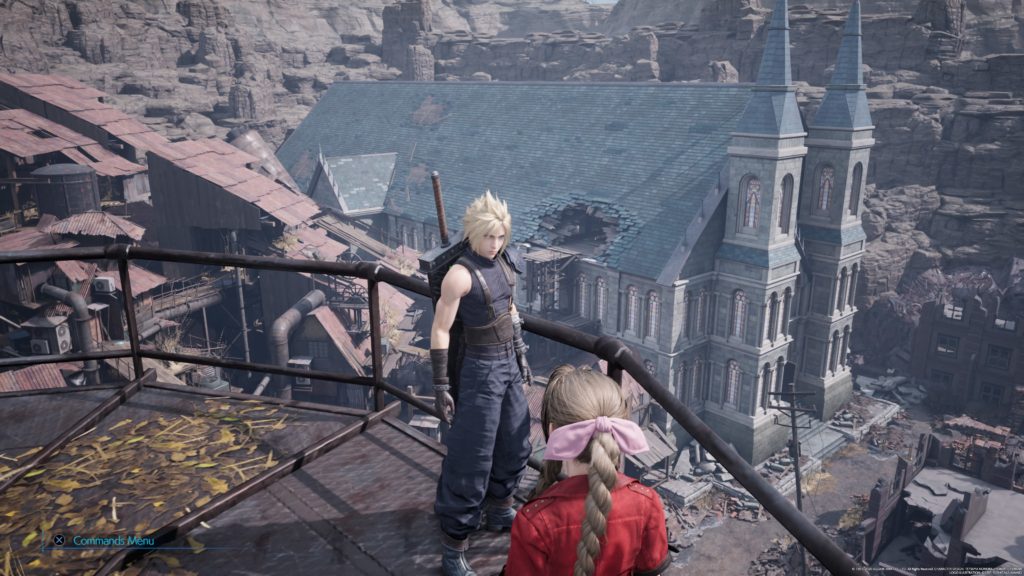
It was absolutely stunning that this game was made, and even more stunning that it came out in the form it did. Square avoided going for a straight nostalgic remake, and rewrote the book about what FF7 means. In doing so, they’ve crafted an experience that feels somewhat familiar in story, completely modern in execution, and leaves some room in the story for them to finish leaving nostalgia behind and craft a really compelling new story for the gang. This took what was already an intriguing world, and elevated it to a new level that feels completely alive. They’ve crafted what is one of the best blends of action and turn-based role-playing that I’ve ever had my hands on. They’ve also done it with modern technology, giving them the most seamless blend of visual fidelity and story telling tools that they could ever hope for. My hope for part 2 is that they continue to push the boundaries for the game instead of falling back on nostalgia, but this one has certainly pushed me from a place of cautious hope to a complete state of hype to see what ends up being in store.
